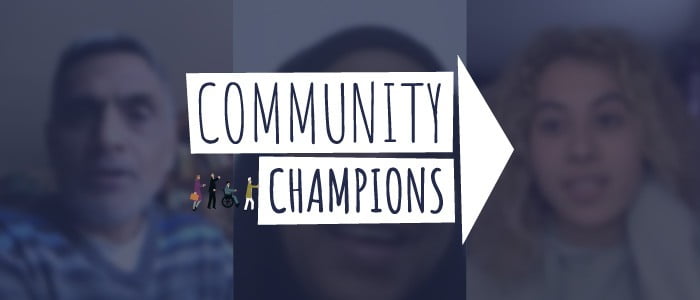Community Champions Programme – What did we learn?

For the last four months, FaithAction were commissioned by Strengthening Faith Institutions to run our Community Champions programme, to encourage people within certain high-risk communities to get themselves vaccinated against COVID-19 and to keep themselves COVID safe, and to gather insight on the major issues and concerns these communities are facing. Our 31 Community Champions came from a range of different faith groups and represented faith communities from across the country. Many of our Champions were already doing fantastic work promoting the vaccine to their communities and answering the questions that they were asked, and this project was designed to help support them with this.
Vaccine Concerns
Even though the project was short, the range of concerns expressed by the communities our Champions were speaking to changed a lot over the duration of the project. In the early days of the programme, the main concern for people about the vaccine was around the AstraZeneca vaccine and the increased risk of blood clots for those under-40, which saw the government limit who should receive the AstraZeneca vaccine. As we moved towards the later stages of the project, and the age range of those being called to have the vaccine lowered, fertility became the largest issue the communities had about the vaccine, with many of our Champions reporting that young people were concerned that having the vaccine would affect their ability to have children and that the vaccine could have a negative effect on pregnant women, despite there being no evidence to support either claim and pregnant women being encouraged by health professionals to take the vaccine.
The Delta Variant
The greatest challenge overall faced by these communities, one that started to emerge during the later months of the project, was the rise of the Delta variant. As the variant first started to be identified and concern grew around its spread, particularly in the North West of England, our Champions in the area were reporting how fearful the communities were about the spread of the variant, and how quickly it had taken hold within their communities. In particular, there was a lot of concern that the rise of the variant would lead to an increase in restrictions at a time when all of us were looking forward to seeing progress being made through the government’s road map. As the weeks passed, other Champions, both from areas that had seen a significant rise in Delta variant cases, and those where cases remained low, reported that members of their community were feeling anxious about its spread and what it would mean for the road map. Despite that, many seemed to be encouraged that the vaccine provided excellent protection against the variant, and Champions reported that the rise in cases due to the Delta variant was encouraging people to get vaccinated.
Impact on Mental Health
Another major area of concern the Champions raised is the effect that lockdown has had on the mental health of members of their communities. Loneliness and isolation, particularly of those who were vulnerable and were being asked to shield, was seen as a particular driver of this, but there were also anxieties about the speed at which the country has reopened and a continued fear within communities that, although we had turned a corner with the virus with the fantastic effort made with the vaccination programme, there were still significant risks of catching it. The economic situation, with people facing losing their jobs and worries over how they were going to pay their bills, was also a major contributing factor to this concern.
Health Inequalities
Existing inequalities faced by those from the black and minority ethnic (BAME) communities was also identified by our Champions as a key area. Many within the BAME community have pre-existing conditions, many of which have left these members of the community vulnerable to the virus. In addition, many work in frontline jobs and are more likely to live in poor housing conditions, further raising their risk. These existing inequalities, and the way they have been dealt with, especially during the early days of the pandemic when it became clear that members of the BAME community were being disproportionately affected by the virus, was identified by the Champions as a key point that, for some, undermined trust in government and the vaccine rollout.
However, it was very positive to hear from our Champions that many of the young people they spoke to over the course of the project were keen and excited to be able to play their part in our recovery, and that many, despite false information being spread about the risks to fertility, couldn’t wait until they were called up to have their vaccine.
FaithAction would like to thank all of our Champions for their hard work over the past four months. Their insight has proved invaluable, and we know that all of them will be continuing the vital work of promoting vaccine take-up and encouraging their communities to remain COVID-safe. We’ve been able to build fantastic relationships with all of our champions, and plans are currently being put in place to continue working with all of them – watch this space for more!



